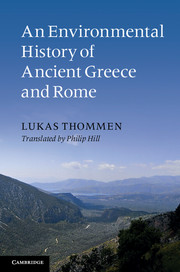Book contents
- Frontmatter
- Contents
- Figures
- Preface
- Introduction
- Part I Greece
- Chapter 1 The geographic space
- Chapter 2 People and nature
- Chapter 3 Agriculture
- Chapter 4 Forests and timber
- Chapter 5 Gardens
- Chapter 6 Animals
- Chapter 7 Food
- Chapter 8 Fire and water
- Chapter 9 Earthquakes and volcanoes
- Chapter 10 Mining
- Part II Rome
- Chronology
- Further reading
- Sources
- Bibliography
- Index
Chapter 2 - People and nature
Published online by Cambridge University Press: 05 June 2012
- Frontmatter
- Contents
- Figures
- Preface
- Introduction
- Part I Greece
- Chapter 1 The geographic space
- Chapter 2 People and nature
- Chapter 3 Agriculture
- Chapter 4 Forests and timber
- Chapter 5 Gardens
- Chapter 6 Animals
- Chapter 7 Food
- Chapter 8 Fire and water
- Chapter 9 Earthquakes and volcanoes
- Chapter 10 Mining
- Part II Rome
- Chronology
- Further reading
- Sources
- Bibliography
- Index
Summary
The issue of environmental behaviour necessarily raises questions about the opinions and images that ancient people had of nature generally. It appears that the Greeks' relationship with nature was fundamentally conflicting. On the one hand, there was the view of a gentle side of nature, including such images as helpful wood nymphs, springs and meadows, and a happy, carefree country life. On the other hand, there was that of the fearsome powers of nature – dark forests, raging streams, stormy seas and wild animals evoked fear and terror. The divine powers and demons who ruled here needed to be calmed by ritual. Agriculture meant an injury to nature, which required rites of expiation; these were also performed when cities were built. The religious respect for the environment was also expressed in the admiration for the fertility gods such as Demeter/Ceres, and the calendar of feast days, with their offerings of thanks and petition, such as the Thargelia in April/May at which the first-fruits were celebrated. Ritual offerings were also made to such climatic elements as the wind, rain and drought, to ensure good harvests.
In addition to these more emotional, irrational views, however, there was also an investigation of the laws of nature. Ionian natural philosophy in the sixth century bc went beyond purely mythical thinking, and tried to explain the world rationally. Instead of holding the gods responsible for natural events, geophysical principles were explored. The doctrines of the four elements fire, air, earth and water by Empedocles of Agrigentum (c. 495–435 bc) and of the smallest indivisible elements, the theory of atomism proposed by Leucippus and his pupil Democritus of Abdera (460–370 bc), were important initial approaches. At the same time, a distinct environmental determinism emerged, promoted particularly by the Hippocratic school of the fifth and fourth centuries bc, and especially reflected in Hippocrates' On Airs, Waters, and Places (Peri aeron, hydaton, topon).
- Type
- Chapter
- Information
- An Environmental History of Ancient Greece and Rome , pp. 29 - 32Publisher: Cambridge University PressPrint publication year: 2012



